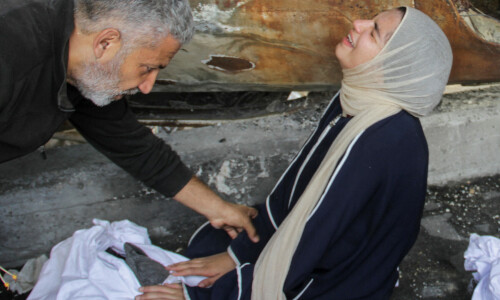
ISLAMABAD: The government has decided not to take up major reconstruction and rehabilitation projects in the flood-hit areas during the current fiscal year because of a financial crunch and negligible fresh aid commitments from the international community.
A Planning Commission official told Dawn on Monday that the entire portfolio of reconstruction and rehabilitation projects costing about $9 billion (Rs765 billion) had been set aside because of shortage of funds.
However, he said, the government had decided to simplify the approval process for such projects to avoid the normal course involving formulation of feasibility studies followed by their technical assessment by the Central Development Working Party and the Executive Committee of the National Economic Council.
“The objective is that these projects may be started without wasting time in case the international community makes available fresh funding.”
Most of the projects relate to public infrastructure and services like roads, bridges, railway tracks, irrigation system, schools, hospitals and power sector installations. Their implementation would take up to four years and require substantial outlays.
Most of the current year's funding has already been earmarked for strategic projects nearing completion and the Public Sector Development Programme (PSDP) has been restricted to Rs140 billion from the original allocation of Rs280 billion.
The official said the international community, particularly the United States, the World Bank and the Asian Development Bank, had offered to divert funds from existing loan portfolios to reconstruction and rehabilitation activities. However, it had also begun interfering in the implementation process by raising transparency issues.
“This was not acceptable to Finance Minister Dr Abdul Hafeez Shaikh who took a strong position against diversion of international funds from ongoing programmes and warned the international donors against maligning the government and its institutions,” he said.
The minister was of the view that some rehabilitation projects, although at a very small scale, could be made available to the international donors for implementation through community-based organisations under citizens' programmes, the official said. That would have eased the pressure on the government, he said.
The official said that since most of the earlier projects destroyed by the floods had proven benefits because they had been serving the needs of the people and the economy, feasibility studies and concept papers were not necessary for them.
“What we need is to update their construction cost and there are set procedures to extrapolate the amount under the Pakistan Engineering Council's standards,” he said.
He said institutional lenders like the World Bank had advised the government that its fiscal position would weaken if it had to bear a large part of the rehabilitation and reconstruction cost.
“Estimates of the reconstruction cost range from Rs662 billion (4.5 per cent of GDP) to Rs779 billion (5.3 per cent),” the bank said.
The official said the PSDP did not have room for rationalising and reprioritisation and taking loans for reconstruction would increase fiscal deficit because of a build-up of public debt which would have adverse fiscal and economic implications in future.
The federal government hopes that the provinces will launch some of the important projects from their development allocations over the next two to three years.
A damage and needs assessment led by the World Bank and the ADB had put reconstruction cost of housing, health and education sectors at Rs234 billion; irrigation, transport and communications, water supply and sanitation and energy at Rs300 billion; agriculture, private industries, financial sector and social protection and livelihoods at Rs197 billion; and governance, disaster risk management and environment at Rs25 billion.














































Dear visitor, the comments section is undergoing an overhaul and will return soon.